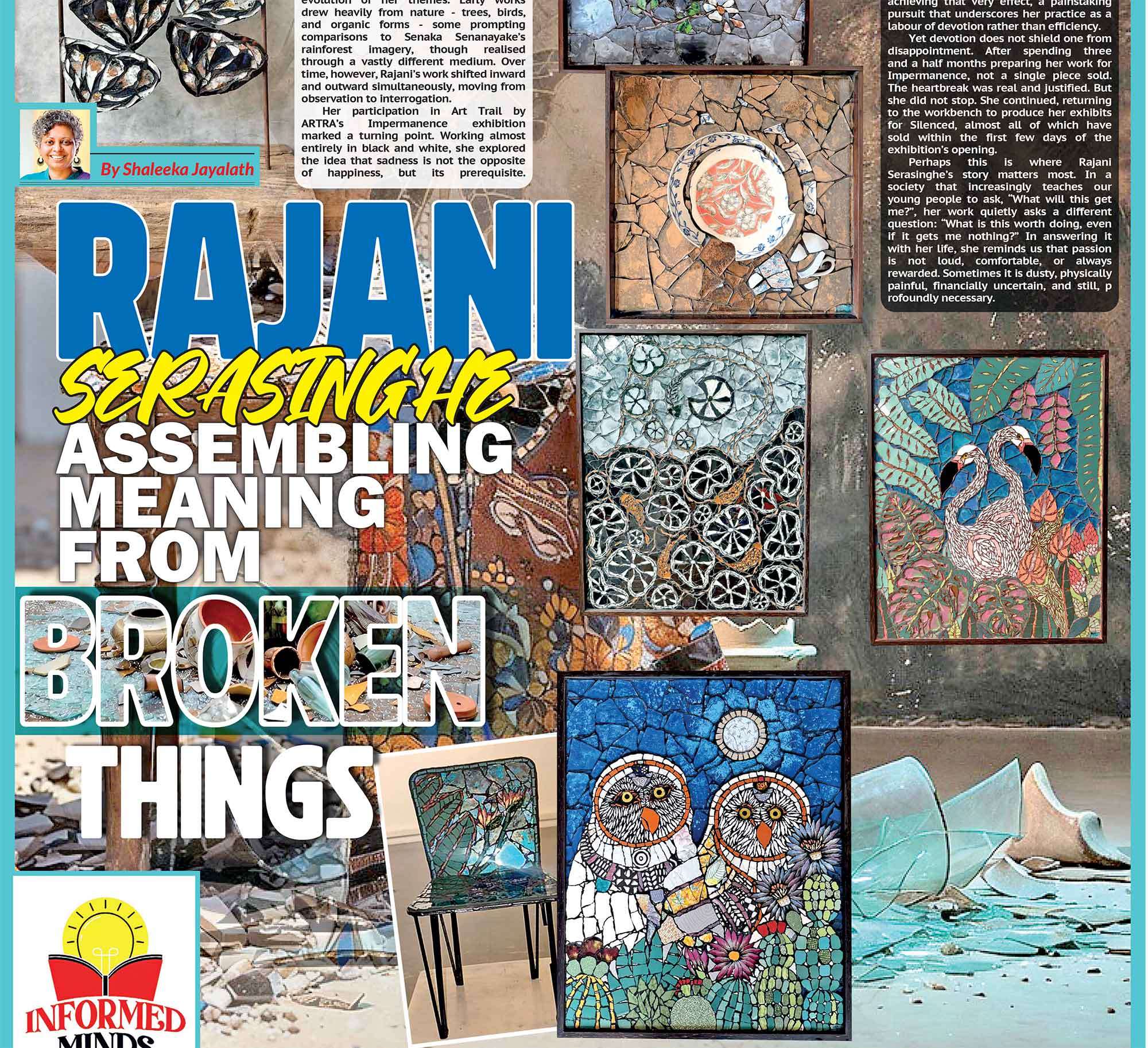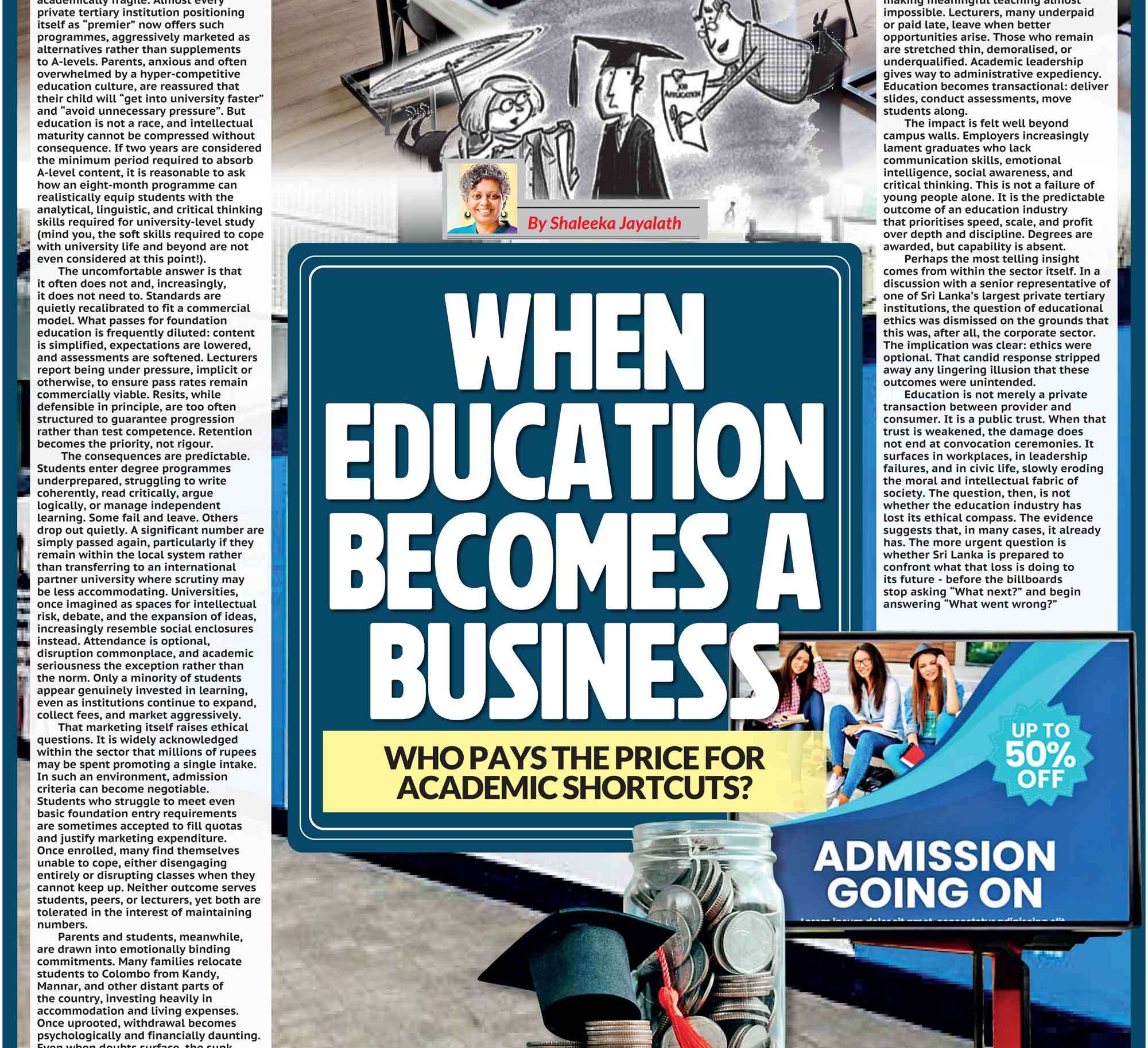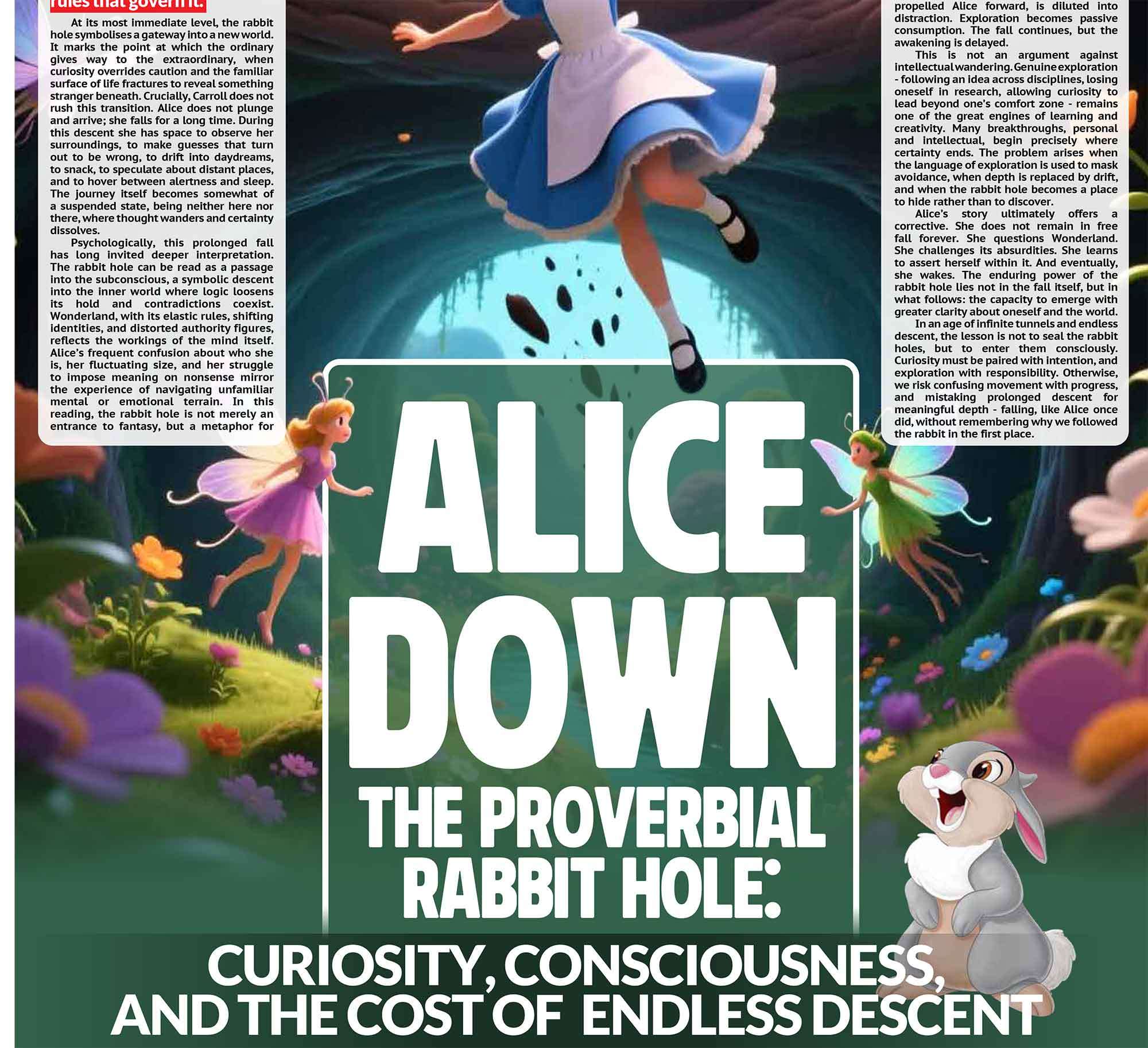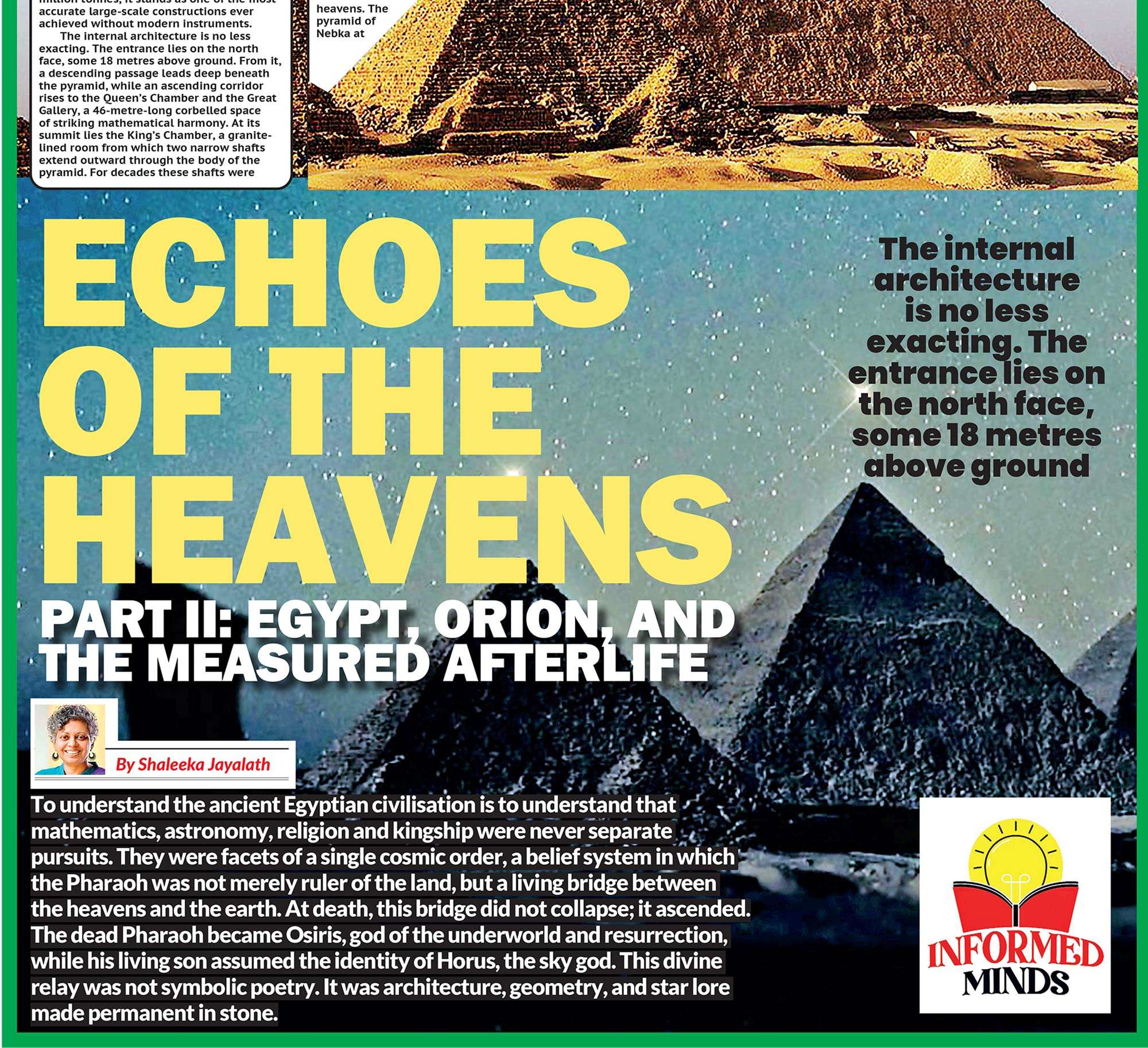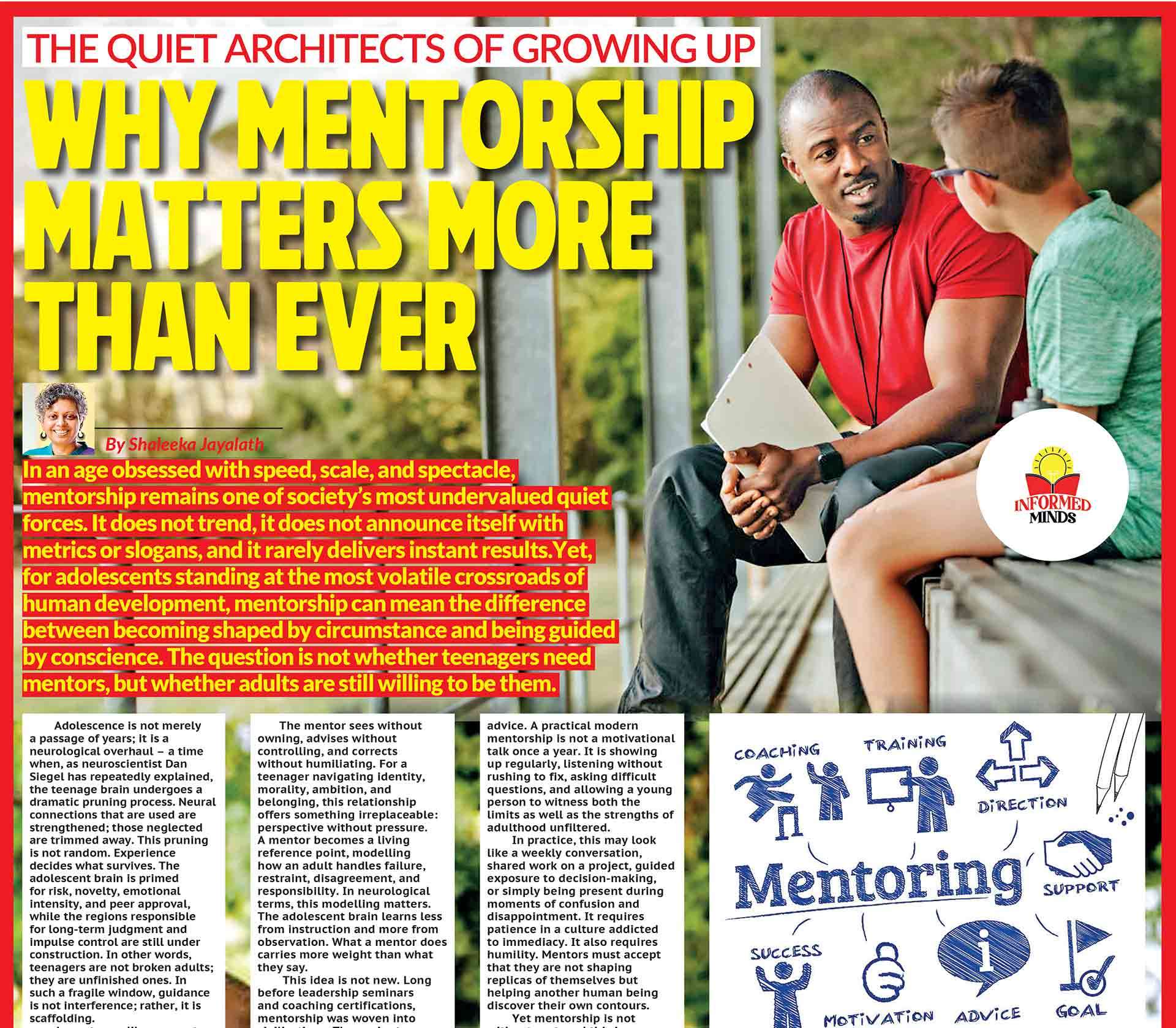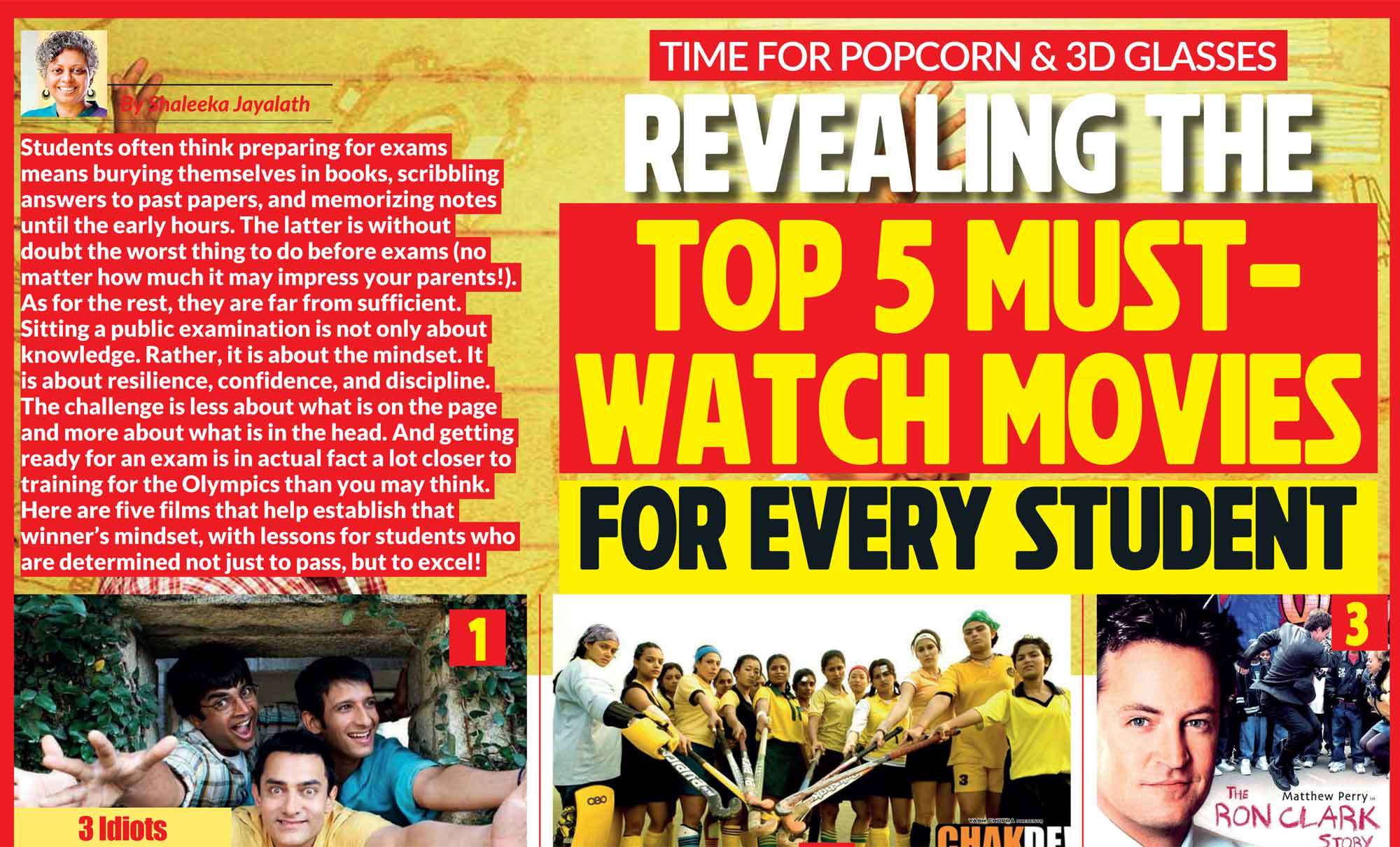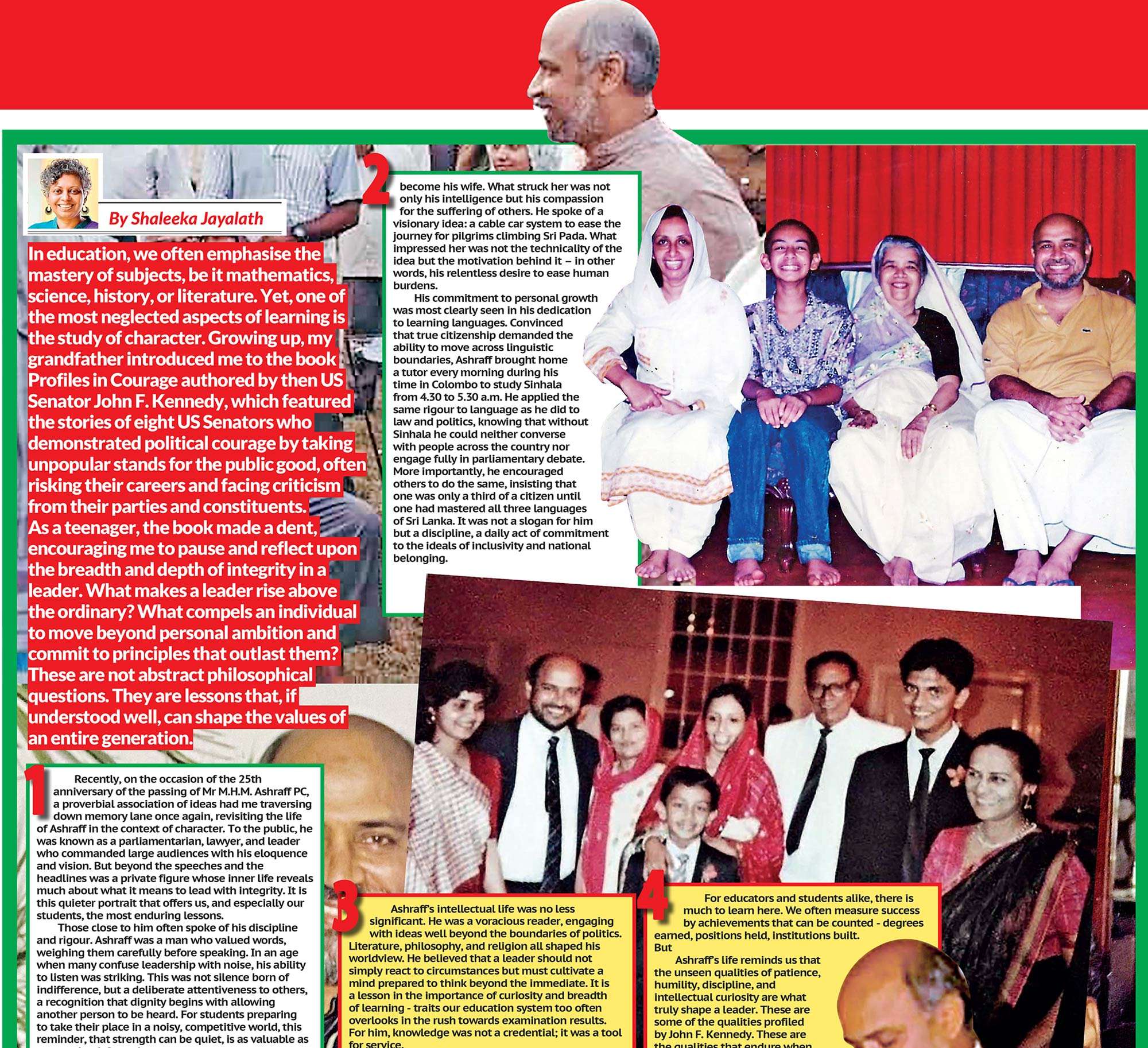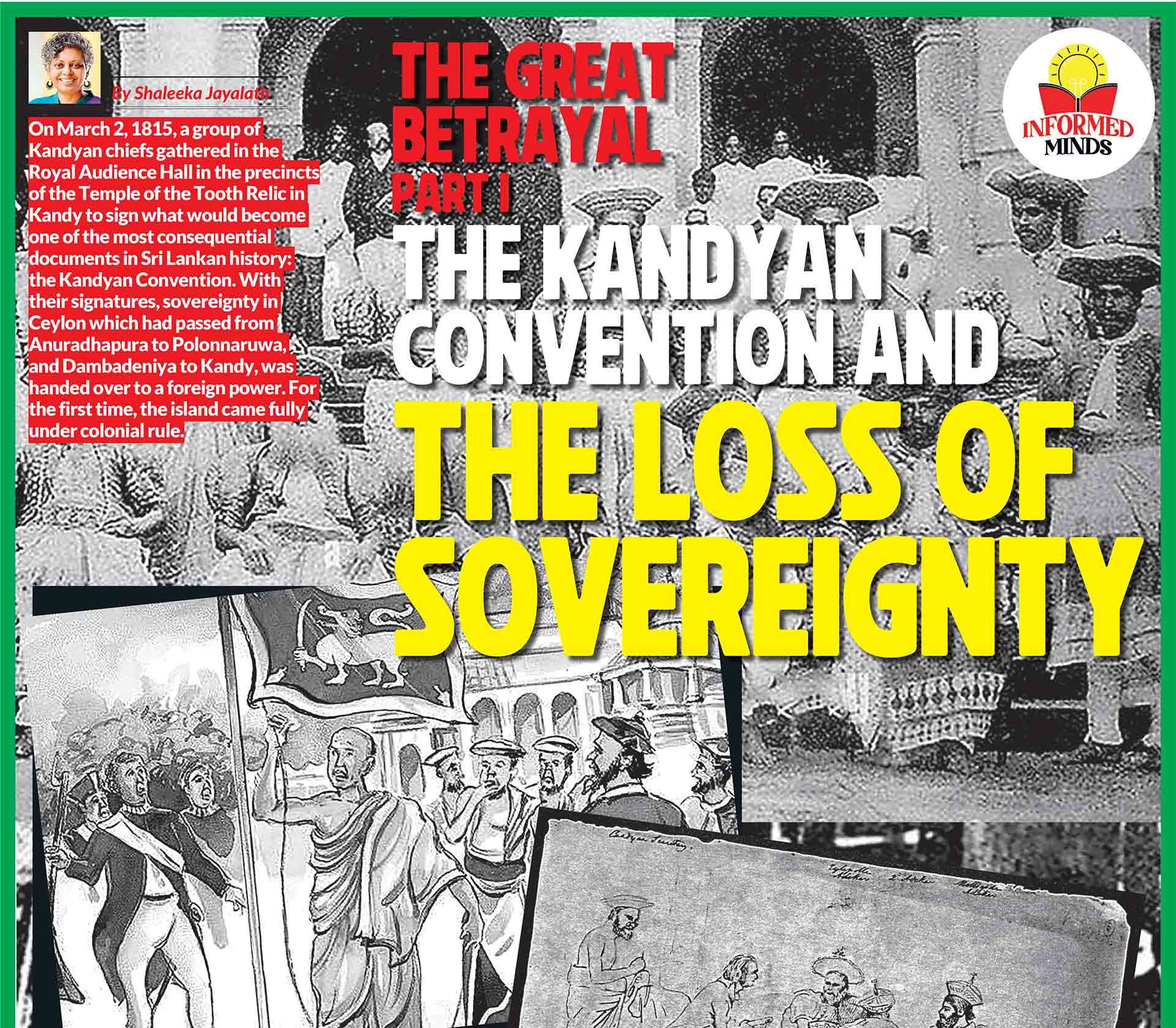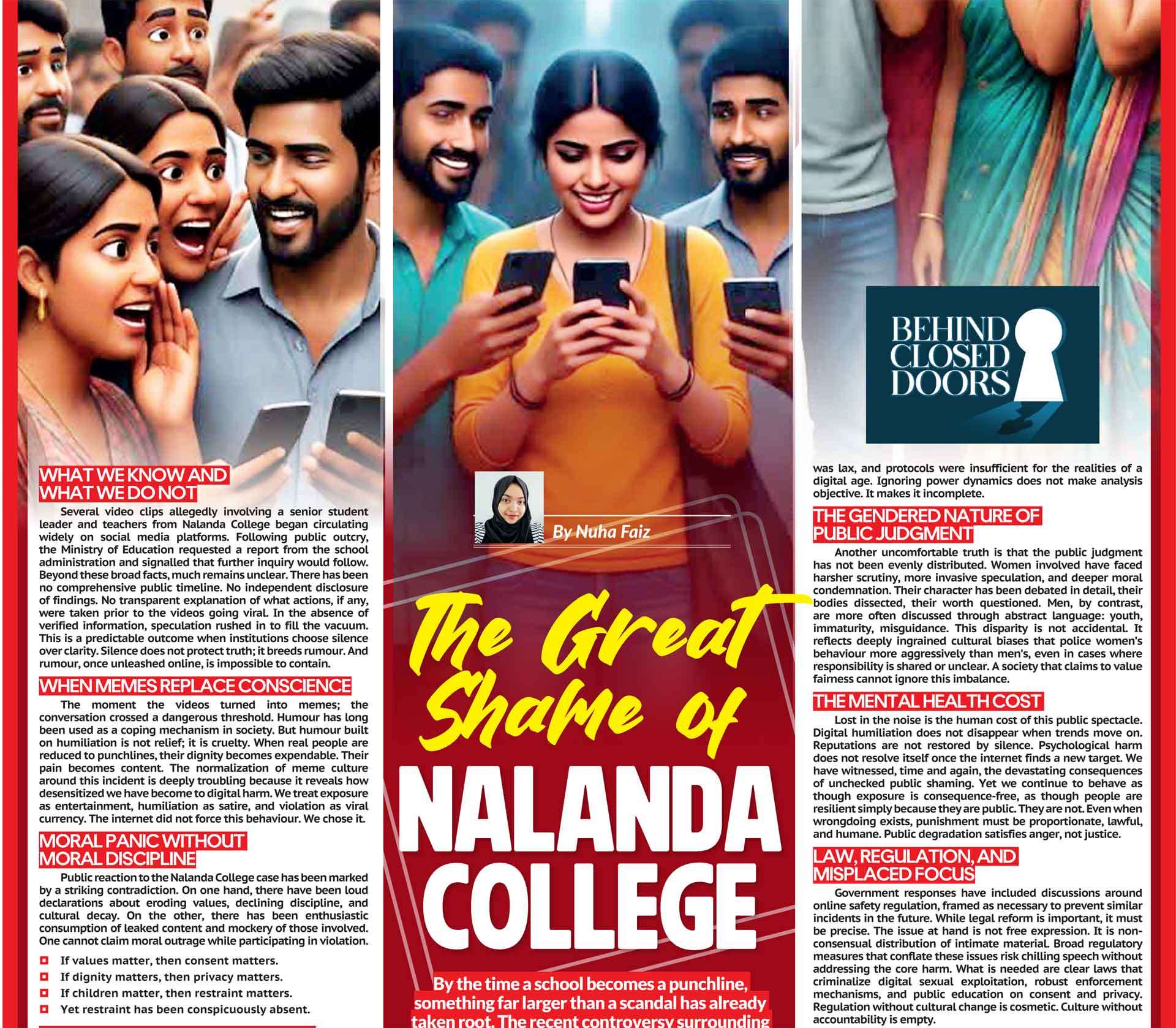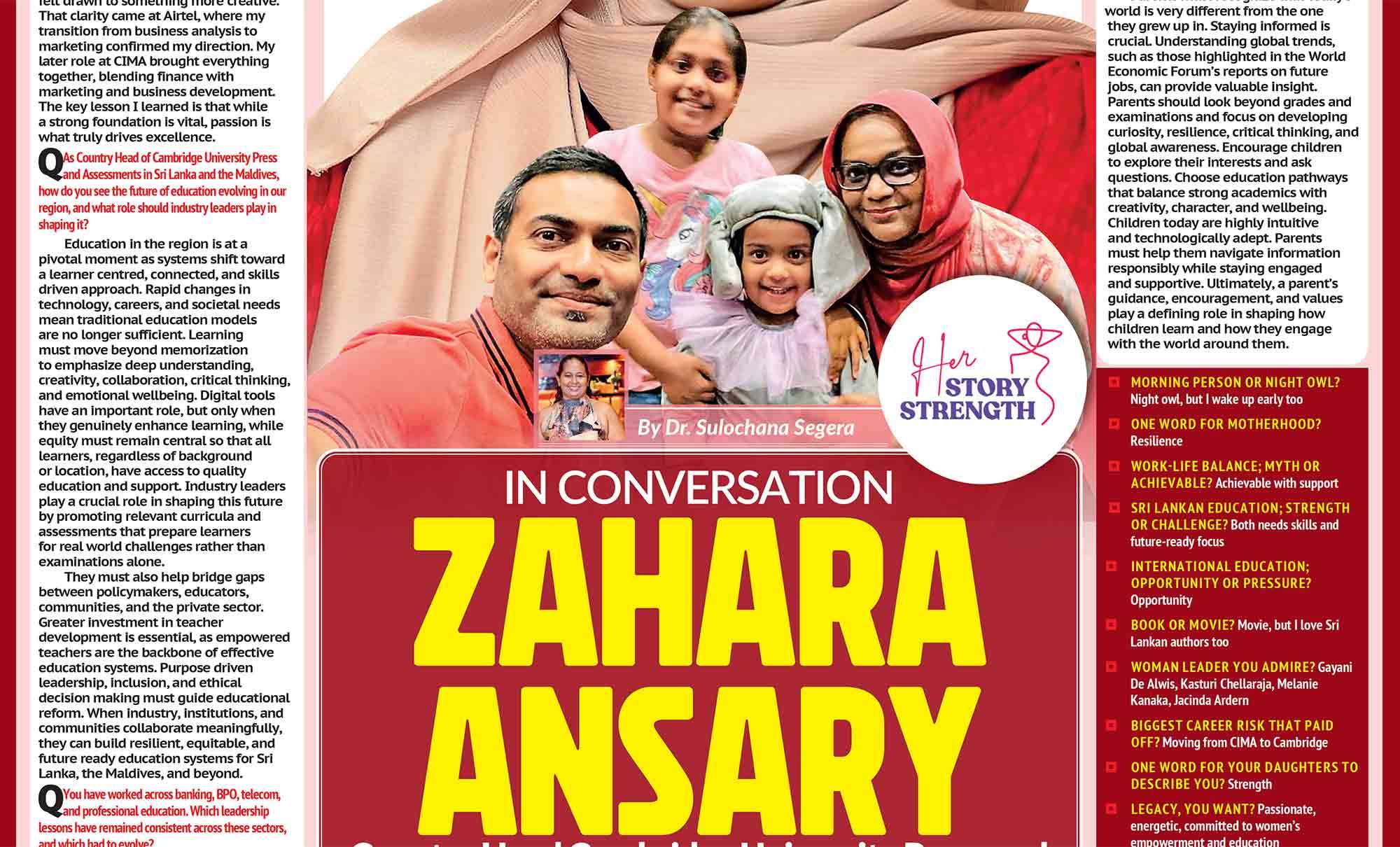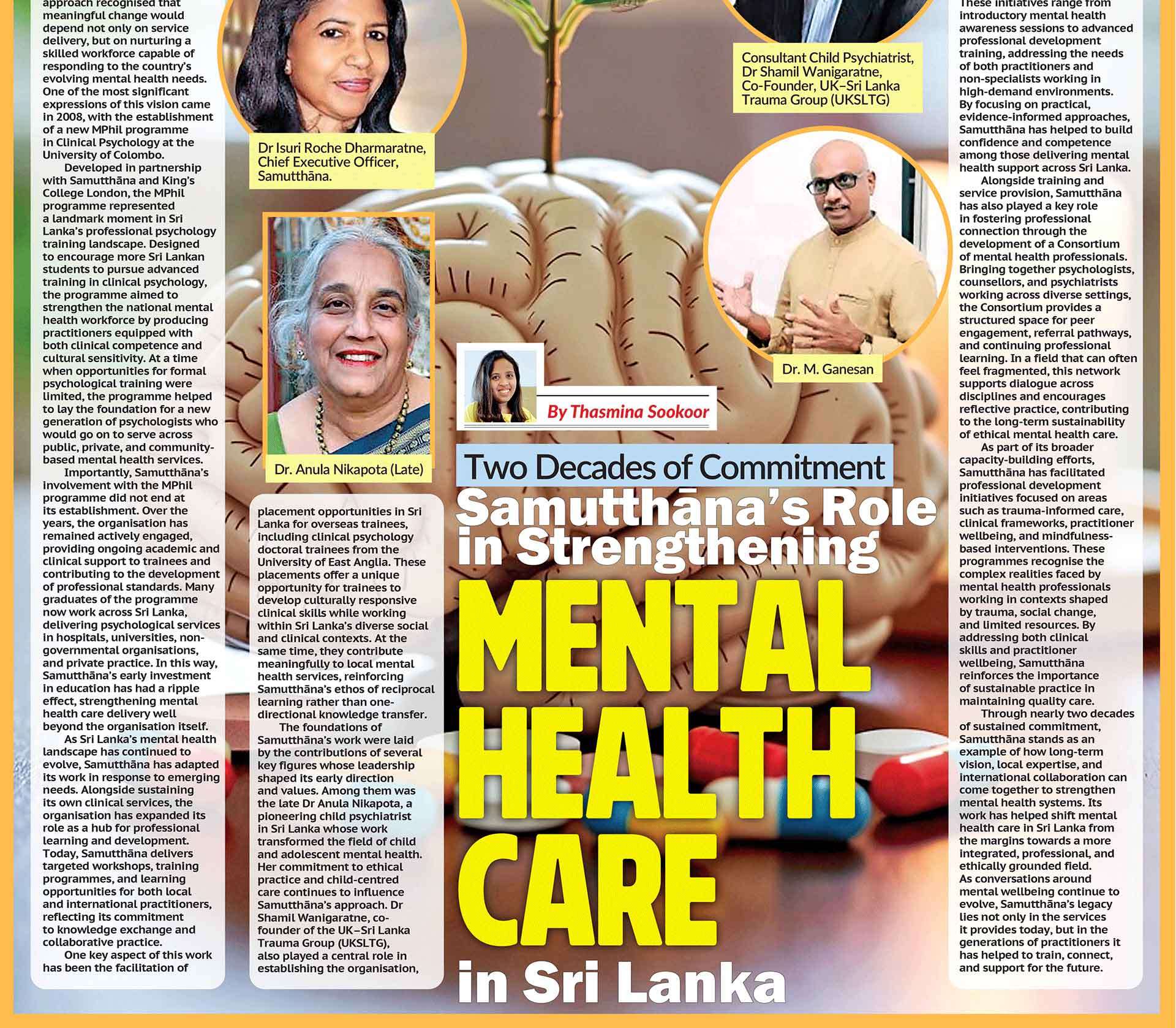RAJANI SERASINGHE: ASSEMBLING MEANING FROM BROKEN THINGS
In an age obsessed with outcomes, metrics, and visibility, we rarely pause to ask what it means to persist when none of those are guaranteed. We celebrate success, but seldom examine the quiet stamina required to continue when recognition is delayed, profit uncertain, and the work itself exacts a physical toll. The story of mosaic artist Rajani Serasinghe invites us to reconsider what passion really looks like when stripped of glamour and applaus
WHEN EDUCATION BECOMES A BUSINESS: WHO PAYS THE PRICE FOR ACADEMIC SHORTCUTS?
Drive through Colombo or its ever-developing outskirts and the message is unavoidable. Smiling teenagers beam down from billboards asking, “After O-levels? What next?” The implication is clear: why endure the rigour of A-levels when a faster, shinier, allegedly smarter alternative is waiting just around the corner? Eight months, they promise. A shortcut to university. A head start in life. What these advertisements do not disclose is the ethical
Alice down the proverbial rabbit hole: curiosity, consciousness, and the cost of endless descent
There are few images in literature as striking and enduring as that of a curious young girl tumbling headlong down a rabbit hole into a world that defies logic and expectation. When
ECHOES OF THE HEAVENS
To understand the ancient Egyptian civilisation is to understand that mathematics, astronomy, religion and kingship were never separate pursuits.
ECHOES OF THE HEAVENS THE ORION MYSTERY AND THE MATHEMATICS OF THE ANCIENT WORL
Let us begin with a question as old as human curiosity itself: What is a constellation? At its most basic, a constellation is a group of stars that, to the attentive human eye (with the exception of Gen Z or Gen Alpha
THE QUIET ARCHITECTS OF GROWING UP WHY MENTORSHIP MATTERS MORE THAN EVER
In an age obsessed with speed, scale, and spectacle, mentorship remains one of society’s most undervalued quiet forces. It does not trend, it does not announce itself with metrics or slogans, and it rarely
THE REAL MAGIC OF CHRISTMAS MFORT, MMERCE, OR NSCIENCE
Each December, a “magical” transformation takes place.
FRANKENSTEIN: AMBITION, RESPONSIBILITY, AND THE MAKING OF MONSTERS
In the summer of 1816, an eighteen-year-old Mary Shelley sat by Lake Geneva alongside Lord Byron, Percy Shelley, and John Polidori to take part in a playful ghost-story competition among friends, little knowing she would ignite one of the most enduring works of English literature: Frankenstein; or The Modern Prometheus. By the time Mary Shelley was nineteen, the draft was complete. When the novel finally appeared in print in 1818, she was only tw
THE GAMES WE PLAY WHY SPORTS STILL MATTER IN AN AGE THAT KEEPS LOSING ITS BALANCE
Long before sports became a medley of branded jerseys, papare bands, and parents arguing with referees, they served a far more brutal purpose: preparing men for war. The Spartans, ever practical,
THE PRICE OF EVERYTHING AND THE VALUE OF NOTHING CONSUMERISM AND THE EROSIO ETHICSN OF CORPORATE
In recent years, we have witnessed a troubling convergence of three phenomena: the proliferation of consumer-goods, the ever-expanding influence of corporate power, and a corresponding decline in the
THE FORGOTTEN HARMONY OF PHI REDISCOVERING THE DIVINE PROPORTION
In an age obsessed with speed and surface, we have forgotten how to see. Our eyes have a habit of skimming across images, screens, and faces, but rarely pause to marvel at the geometry that quietly
ECHOES OF CONSCIENCE, PART III THE MORAL COMPASS OF OUR AGE
History remembers its great reformers not only for what they opposed, but for what they proposed: a vision of humanity anchored in conscience. Gandhi, King, and Mandela each challenged the injustices of their
ECHOES OF CONSCIENCE, PART II MANDELA AND LEGACY
In tracing the moral lineage of non-violent resistance, one finds a remarkable thread that winds its way from the railways of Pietermaritzburg to the streets of Montgomery, and finally, to the prisons of Robben
ECHOES OF CONSCIENCE PART I GANDHI AND MARTIN LUTHER KING JR
In the story of human progress, some figures emerge whose ideas transcend borders, languages and centuries. Mahatma Gandhi and Martin Luther King Jr. were two such figures. The former faced
THE DEATH OF OLD-FASHIONED ROMANCE: WHAT GEN Z NEED TO KNOW ABOUT LOVE
A generation or two ago, romance was similar to a quiet flame, tended to with care. Today, it tends to be more akin to a firework that fizzles out the moment the spectacle is over. What happened to good old-
TIME FOR POPCORN & 3D GLASSES Revealing The Top 5 Must-Watch Movies For Every Student
Students often think preparing for exams means burying themselves in books, scribbling answers to past papers, and memorizing notes until the early hours. The latter is without doubt the worst thing to do
THE UNTOLD LESSONS OF LEADERSHIP: REMEMBERING M.H.M. ASHRAFF
In education, we often emphasise the mastery of subjects, be it mathematics, science, history, or literature. Yet, one of the most neglected aspects of learning is the study of character.
THE GREAT BETRAYAL, PART II QUESTIONING THE SRI LANKAN IDENTITY
We often speak of Sri Lankan identity as if it is ancient, singular, and uncontested. Politicians invoke it, textbooks promote it, and we cling to it as a marker of who we are. But what if this very idea is an illusion?
THE GREAT BETRAYAL PART I THE KANDYAN CONVENTION AND THE LOSS OF SOVEREIGNTY
On March 2, 1815, a group of Kandyan chiefs gathered in the Royal Audience Hall in the precincts of the Temple of the Tooth Relic in Kandy to sign what would become one of the most consequential documents
BETWEEN PROMISE AND PERIL THE TEST OF EDUCATIONAL REFORM
Of late, the Government of Sri Lanka has been speaking (quite rightly!) of educational reform. The Honourable Prime Minister, speaking on behalf of the Government, stated, “Our foremost function is to


